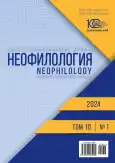Reception of the “Dostoevsky myth” in the philosophical works of N.A. Berdyaev and V.I. Ivanova
- Authors: Serebriakov A.A.1, Zheleznyak D.R.1
-
Affiliations:
- North-Caucasus Federal University
- Issue: Vol 10, No 1 (2024)
- Pages: 95-106
- Section: RUSSIAN LITERATURE AND LITERATURE OF PEOPLES OF RUSSIAN FEDERATION
- URL: https://journal-vniispk.ru/2587-6953/article/view/295568
- DOI: https://doi.org/10.20310/2587-6953-2024-10-1-95-106
- ID: 295568
Cite item
Full Text
Abstract
INTRODUCTION. The work is devoted to the consideration of the characteristics of the artistic anthropology reception by F.M. Dostoevsky in the philosophical works of thinkers of the “Russian religious renaissance”. The relevance of this issue formulation lies in the broad research interest in the interdisciplinary study of Dostoevsky’s work at the intersection of literary studies, philosophy, and culturology; in the active appeal of modern literary scholars and philosophers to the issues of Dostoevsky’s “presence” in the culture of the 20th century; as well as the significance of the philosophical discoveries of N.A/ Berdyaev and V.I. Ivanov for the study of Dostoevsky’s artistic philosophy. The scientific problem lies in the very depth of the influence of Dostoevsky’s philosophical worldview on the literature and philosophy of the subsequent century, which has not yet been fully clarified. The purpose of the study is to identify and characterize the main features of the reception of Dostoevsky’s artistic anthropology in the philosophical works of N.A. Berdyaev and V.I. Ivanov.MATERIALS AND METHODS. We turn to the object of study – the philosophical work of N. Berdyaev and V. Ivanov, inscribed in the context of the reception of the “Dostoevsky myth”, relying on intertextual and historical-genetic methods in the context of a general hermeneutic approach.RESULTS AND DISCUSSION. F.M. Dostoevsky with all his artistic and journalistic creativity made a shift in the understanding of human, in his works a new approach to artistic anthropology was implemented, which assigned a very special place to human. As we can see, in his anthropocentric worldview, Dostoevsky provides a philosophical synthesis of the absoluteness of the individual personality and the prin-ciple of the spiritual unity of all people. The era of the Russian religious renaissance played a unique role in the history of the reception of Dostoevsky’s artistic discoveries and philosophical intuitions.CONCLUSION. F.M. Dostoevsky was, as N.A. Berdyaev, A.F. Losev, D.S. Merezhkovsky believed, the spiritual primary source of thought of the entire Silver Age, which rose “under the sign” of Dostoevsky, since it was he who forcefully actualized the world of apocalyptic self-division of human. Anthropodicy of N.A. Berdyaev is immersed in a special eschatological atmosphere, in which the philosopher turns to the writer’s work. In the interpretation of V.I. Ivanov Dostoevsky’s mystical realism reveals the eternal “tragedy of the spirit” playing out between the divine and created principles in human.
About the authors
A. A. Serebriakov
North-Caucasus Federal University
Email: aasereb@mail.ru
ORCID iD: 0000-0003-1059-8328
Dr. habil. (Philology), Professor of Russian and World Literature Department
1 Pushkina St., Stavropol, 355017, Russian FederationD. R. Zheleznyak
North-Caucasus Federal University
Author for correspondence.
Email: soul.darya@bk.ru
ORCID iD: 0000-0001-6866-6771
Research Scholar at the Research Laboratory “Modern Literary Process in the North Caucasus”, Russian and World Literature Department
1 Pushkina St., Stavropol, 355017, Russian FederationReferences
- Nizhnikov S.A. F.M. Dostoevsky and the concept of “Russian idea”. Vestnik Kalmytskogo universiteta = Bulle-tin of Kalmyk University, 2016, no. 1 (29), pp. 104-111. (In Russ.) https://elibrary.ru/vswyhr
- Kantor V.K. Berdyaev o Dostoevskom: teoditseya i svoboda [Berdyaev on Dostoevsky: theodicy and free-dom]. Filosofskie nauki = Russian Journal of Philosophical Sciences, 2014, no. 4, pp. 52-64. (In Russ.) https://elibrary.ru/shcztn
- Yudakhin A.A. “Do you know, I have thought of giving up the world to the Pope...”: the anti-catholic layer of the novel by F.M. Dostoevsky “Demons”. Neofilologiya = Neophilology, 2023, vol. 9, no. 3, pp. 573-582. (In Russ.) https://doi.org/10.20310/2587-6953-2023-9-3-573-582, https://elibrary.ru/wglzmu
- Bodea R.-O. Nikolai Berdyaev’s dialectics of freedom: in search for spiritual freedom. Open Theology, 2019, no. 5, pp. 299-308. https://doi.org/10.1515/opth-2019-0023
- Kasatkina T.A. Yavlenie ehskhatona: fenomen F.M. Dostoevskogo na rubezhe XIX–XX vv. [The phenomenon of the eschaton: the phenomenon of F.M. Dostoevsky at the turn of the 19th–20th centuries]. Utopiya i ehskhatologiya v kul’ture russkogo modernizma [Utopia and Eschatology in the Culture of Russian Modernism]. Moscow, Indrik Publ., 2016, pp. 372-389. (In Russ.) https://elibrary.ru/xajdgx
- Evlampiev I.I. Dostoevskii i russkaya filosofiya nachala XX veka [Dostoevsky and Russian philosophy of the early 20th century]. F.M. Dostoevskii: pro et contra, antologiya [F.M. Dostoevsky: Pro et Contra, Anthology]. St. Petersburg, Russian Christian Humanitarian Academy Publ., 2022, vol. 1, pp. 7-30. (In Russ.)
- Grillaert N. What the God-Seekers Found in Nietzsche: the Reception of Nietzsche’s Übermensch by the Philo-sophers of the Russian Religious Renaissance. Amsterdam, New York. Rodopi Publ., 2008, 282 p. https://doi.org/10.1163/9789401206433
- Kibal’nichenko S.A. New aeschylus: the myth about Dostoevsky in Vyacheslav Ivanov’s philosophical prose. Russko-Vizantiiskii vestnik = Russian-Byzantine Herald, 2022, no. 3 (10), pp. 58-79. (In Russ.) https://doi.org/10.47132/2588-0276_2022_3_58, https://elibrary.ru/rusqwt
- Keldysh V.A. Nasledie F.M. Dostoevskogo v filosofskoi i literaturno-kriticheskoi mysli Serebryanogo veka russ-koi literatury [Dostoevsky in the philosophical and literary critical thought of the Silver Age of Russian litera-ture]. Moscow, IWL RAS Publ., 2019, 280 p. (In Russ.) https://doi.org/10.22455/978-5-9208-0609-3, https://elibrary.ru/lfwsor
- Serebryakov A.A., Zheleznyak D.R. The interaction of the structural construction principles in the F.M. Dos-toevsky’s novel “The Idiot”. Neofilologiya = Neophilology, 2022, vol. 8, no. 2, pp. 303-311. (In Russ.) https://doi.org/10.20310/2587-6953-2022-8-2-303-311, https://elibrary.ru/bcngir
Supplementary files









